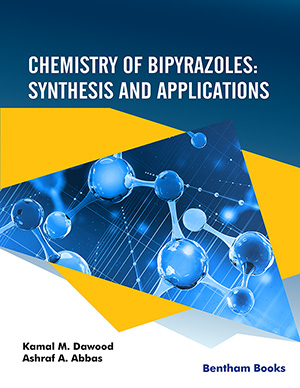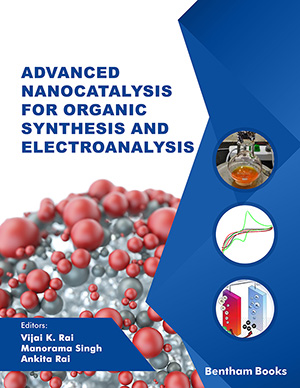
Abstract
The Pschorr reaction is a classical ring closure process for the formation of polycyclic systems in which two aryl moieties are joined together. It represents a bridge that connects diazonium ion chemistry with PAH synthesis. The Pschorr reaction has been employed as a key step in a number of carbocyclic and heterocyclic ring forming transformations for the synthesis of complex polycyclic molecules. Our continuing interest in diazonium ion chemistry and PAH chemistry prompted us to review the status of this transformation and to summarize the more recent developments in the use of this classical reaction.
Keywords: Pschorr reaction, intramolecular coupling, diazotization, dediazoniation, aryl radicals, isomerization by 1, 5-H migration, PAH and hetero-PAH synthesis
Current Organic Synthesis
Title: The Pschorr Reaction, a Fresh Look at a Classical Transformation
Volume: 6 Issue: 2
Author(s): Kenneth K. Laali and Mohammadreza Shokouhimehr
Affiliation:
Keywords: Pschorr reaction, intramolecular coupling, diazotization, dediazoniation, aryl radicals, isomerization by 1, 5-H migration, PAH and hetero-PAH synthesis
Abstract: The Pschorr reaction is a classical ring closure process for the formation of polycyclic systems in which two aryl moieties are joined together. It represents a bridge that connects diazonium ion chemistry with PAH synthesis. The Pschorr reaction has been employed as a key step in a number of carbocyclic and heterocyclic ring forming transformations for the synthesis of complex polycyclic molecules. Our continuing interest in diazonium ion chemistry and PAH chemistry prompted us to review the status of this transformation and to summarize the more recent developments in the use of this classical reaction.
Export Options
About this article
Cite this article as:
Laali K. Kenneth and Shokouhimehr Mohammadreza, The Pschorr Reaction, a Fresh Look at a Classical Transformation, Current Organic Synthesis 2009; 6 (2) . https://dx.doi.org/10.2174/157017909788167275
| DOI https://dx.doi.org/10.2174/157017909788167275 |
Print ISSN 1570-1794 |
| Publisher Name Bentham Science Publisher |
Online ISSN 1875-6271 |
Call for Papers in Thematic Issues
Biorthogonal Chemistry: A translational Chemical Tool for In Vivo Applications
After the discovery in 1990, bioorthogonal chemistry encompassed a set of diverse, fast-paced selective chemical reactions, facilitating the study of biomolecules under physiological aura without intervening in the biochemical processes. Over the past two decades, significant progress has been witnessed in bioorthogonal reactions such as Staudinger ligation, metal-catalyzed coupling reactions, ...read more
Design and Synthesis of Green Pesticides
The development of new green pesticides is currently one of the hotspots in the field of pesticide research, aiming to develop efficient, environmentally friendly, and safe pesticide products to meet the needs of modern agricultural production. New green pesticides prioritize environmental friendliness and ecological safety. Therefore, during the research and ...read more
Exploring the Role of Chemical Graph Theory in Advancing Current Organic Synthesis
Organic synthesis is a fundamental discipline in chemistry, which is crucial for the creation of complex molecules with diverse applications in pharmaceuticals, materials science, and beyond. However, the process of designing efficient synthetic routes for target molecules remains challenging. Chemical graph theory, a branch of theoretical chemistry, offers powerful tools ...read more
Novel Green Approaches in the Synthesis of Bioactive Molecules
This special issue regards several aspects of green chemistry, focusing on innovative strategies to run organic synthesis reactions in a more environmentally friendly. Interesting articles or reviews about the critical role of green methodologies in reducing the environmental impact of chemical processes are welcome. Moreover, novel methodological studies using sustainable ...read more
Related Journals
 39
39
- Author Guidelines
- Graphical Abstracts
- Fabricating and Stating False Information
- Research Misconduct
- Post Publication Discussions and Corrections
- Publishing Ethics and Rectitude
- Increase Visibility of Your Article
- Archiving Policies
- Peer Review Workflow
- Order Your Article Before Print
- Promote Your Article
- Manuscript Transfer Facility
- Editorial Policies
- Allegations from Whistleblowers
























